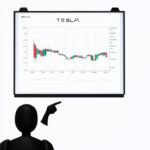Understanding the Impact of Elon Musk Tweets on Tesla Stock Price

Introduction: The Influence of Elon Musk on Tesla Stock Price
Elon Musk, the charismatic CEO of Tesla, has a significant influence on the company’s stock price. As a pioneer in both the electric vehicle and space exploration industries, Musk’s actions and statements are closely monitored by investors and analysts alike. His unique approach to leadership and communication, especially on social media, has had profound impacts on Tesla’s market performance. Understanding how Musk’s tweets affect Tesla’s stock price can provide valuable insights for investors and market observers.
Overview of Elon Musk’s Role at Tesla
Elon Musk is not just the CEO of Tesla; he is the visionary behind the company’s mission to accelerate the world’s transition to sustainable energy. Since joining Tesla in 2004, Musk has been instrumental in driving innovation and growth. His hands-on approach and bold decision-making have helped Tesla become a leader in the electric vehicle market. Musk’s influence extends beyond his executive role, as his public statements and social media presence often shape investor sentiment and market dynamics.
Brief History of Tesla Stock Performance
Tesla’s stock has experienced a meteoric rise since its initial public offering (IPO) in 2010. Initially priced at $17 per share, Tesla’s stock has seen significant volatility but has generally trended upward, reaching all-time highs in recent years. Key milestones, such as the launch of new vehicle models and advancements in battery technology, have driven the stock’s performance. However, the stock’s volatility can also be attributed to external factors, including Musk’s public statements and tweets.
The Power of Social Media in Modern Stock Markets
In the digital age, social media platforms like Twitter have become powerful tools for communication and information dissemination. For influential figures like Elon Musk, a single tweet can reach millions of followers instantly, creating immediate market reactions. Investors and traders closely monitor social media for real-time insights and potential market-moving information. This phenomenon has introduced new dynamics to stock markets, where sentiment and perception can drive significant price movements.
The Correlation Between Elon Musk’s Tweets and Tesla Stock Price
Analyzing Key Instances of Impactful Tweets
Elon Musk’s tweets have repeatedly demonstrated their ability to move Tesla’s stock price. By analyzing specific instances where Musk’s tweets led to noticeable market reactions, we can better understand this correlation. For example, Musk’s tweet about taking Tesla private at $420 per share caused a significant spike in the stock price, followed by regulatory scrutiny. This and other tweets provide valuable case studies for examining the impact of Musk’s social media activity on Tesla’s market performance.
Statistical Correlations: Do Tweets Really Move the Market?
Numerous studies have analyzed the statistical correlations between Elon Musk’s tweets and Tesla’s stock price movements. While some tweets have led to immediate and significant price changes, others have had minimal impact. By examining trading volumes, price fluctuations, and market sentiment before and after Musk’s tweets, researchers have identified patterns that suggest a strong influence. However, the degree of impact can vary based on the content and context of the tweets.
Expert Opinions on the Influence of Social Media
Financial experts and market analysts have weighed in on the influence of social media, particularly Musk’s tweets, on stock prices. Many agree that Musk’s unique position as a high-profile CEO with a massive social media following amplifies his impact. Experts also note that the rapid dissemination of information through social media can lead to heightened volatility and short-term price swings. However, they caution against relying solely on social media for investment decisions, emphasizing the importance of fundamental analysis.
Notable Instances When Elon Musk’s Tweets Moved Tesla Stock Price
The “Funding Secured” Tweet
One of the most infamous tweets from Elon Musk came in August 2018 when he announced, “Am considering taking Tesla private at $420. Funding secured.” This tweet caused a dramatic spike in Tesla’s stock price, followed by a period of volatility. The tweet led to an investigation by the Securities and Exchange Commission (SEC) and a settlement requiring Musk to step down as Tesla’s chairman for three years. This incident highlights the significant market influence Musk’s tweets can have, as well as the potential regulatory consequences.
The Cybertruck Announcement
In November 2019, Musk unveiled Tesla’s Cybertruck with a tweet that generated widespread attention and media coverage. The futuristic design of the vehicle and the subsequent demonstration, which included a failed “bulletproof” glass test, led to mixed reactions. Despite the mishap, the tweet and event boosted Tesla’s stock price, as pre-orders for the Cybertruck surged. This instance demonstrates how Musk’s tweets, combined with high-profile product announcements, can create significant market movements.
Bitcoin and Tesla: A Tweeted Connection
In early 2021, Musk tweeted about Tesla’s investment in Bitcoin and its plans to accept the cryptocurrency as payment for its vehicles. This announcement led to a sharp increase in both Tesla’s stock price and the value of Bitcoin. However, Musk later tweeted that Tesla would suspend Bitcoin transactions due to environmental concerns, causing a decline in both assets. These tweets highlight the interconnectedness of Musk’s social media activity and its broader impact on financial markets.
Mechanisms Behind the Impact of Elon Musk’s Tweets on Tesla Stock Price
Market Psychology and Investor Behavior
Elon Musk’s tweets influence market psychology by shaping investor sentiment and expectations. His charismatic personality and reputation as an innovator inspire confidence among his followers and investors. When Musk tweets about Tesla, it often triggers emotional responses, leading to buying or selling decisions. This phenomenon is rooted in behavioral finance, where investor behavior is influenced by cognitive biases and emotions rather than purely rational analysis.
Media Amplification and Public Perception
The media plays a crucial role in amplifying the impact of Musk’s tweets. News outlets and financial analysts quickly report on his social media activity, reaching a broader audience beyond his Twitter followers. This amplification effect can magnify the market reaction, as more investors become aware of the information and act on it. Additionally, public perception of Musk as a visionary leader further enhances the credibility and influence of his tweets.
The Role of Algorithmic Trading
Algorithmic trading, which uses computer algorithms to execute trades based on predefined criteria, can also amplify the impact of Musk’s tweets. Algorithms scan social media platforms for market-moving information, including tweets from influential figures like Musk. When a relevant tweet is detected, these algorithms can trigger automated trading actions, leading to rapid and significant price movements. This automated response can contribute to the volatility observed following Musk’s tweets.
Risks and Challenges of Relying on Elon Musk’s Tweets for Investment Decisions
Volatility and Unpredictability
One of the primary risks of relying on Elon Musk’s tweets for investment decisions is the inherent volatility and unpredictability they introduce. While some tweets may lead to positive market reactions, others can result in sharp declines or regulatory scrutiny. Investors who base their decisions solely on Musk’s social media activity may experience significant fluctuations in their portfolio value, leading to potential financial losses.
Regulatory Scrutiny and Legal Ramifications
Elon Musk’s tweets have occasionally attracted regulatory scrutiny, particularly from the SEC. The “funding secured” tweet, for example, led to an investigation and legal settlement. Regulatory actions can create uncertainty and negatively impact Tesla’s stock price. Investors must be aware of the potential legal ramifications of Musk’s tweets and consider the broader regulatory environment when making investment decisions.
The Danger of Misinformation
Another challenge of relying on Musk’s tweets is the potential for misinformation or misinterpretation. While Musk is known for his transparency and direct communication style, tweets can sometimes be ambiguous or misunderstood. Misinformation can lead to misguided investment decisions and market volatility. Investors should exercise caution and seek additional information from reliable sources before acting on social media posts.
Case Studies: Detailed Analysis of Specific Tweets and Market Reactions
The SolarCity Acquisition Tweet
In 2016, Musk tweeted about Tesla’s acquisition of SolarCity, a solar energy company. The tweet received mixed reactions from investors, with some expressing concerns about potential conflicts of interest. Despite initial skepticism, the acquisition ultimately benefited Tesla by expanding its renewable energy offerings. This case study illustrates the complexities of market reactions to Musk’s tweets and the importance of considering long-term strategic implications.
The “Teslaquila” Tweet
In October 2018, Musk tweeted a playful announcement about a Tesla-branded tequila called “Teslaquila.” While the tweet was intended as a joke, it generated significant media coverage and public interest. Although the tweet did not have a substantial impact on Tesla’s stock price, it demonstrated Musk’s ability to capture attention and create buzz around the brand. This instance highlights the potential for seemingly trivial tweets to influence public perception and brand value.
The Tweet About Taking Tesla Private
The tweet about taking Tesla private at $420 per share remains one of the most controversial and impactful tweets from Elon Musk. The tweet led to a surge in Tesla’s stock price, followed by regulatory investigations and legal challenges. While the proposal did not materialize, the incident underscored the significant market influence of Musk’s tweets and the potential consequences of making bold public statements without sufficient basis.
Strategies for Investors in the Era of Social Media-Driven Market Movements
Diversification and Risk Management
To mitigate the risks associated with social media-driven market movements, investors should prioritize diversification and risk management. By spreading investments across different asset classes and sectors, investors can reduce their exposure to the volatility of individual stocks like Tesla. Additionally, implementing risk management strategies, such as setting stop-loss orders and maintaining a balanced portfolio, can help protect against sudden market fluctuations.
Staying Informed Through Multiple Channels
Relying solely on social media for investment decisions can be risky. Investors should seek information from multiple channels, including financial news, analyst reports, and company disclosures. By staying informed through diverse sources, investors can gain a comprehensive understanding of market trends and make more informed decisions. Cross-referencing information from reputable sources can also help verify the accuracy of social media posts.
Long-Term vs. Short-Term Investment Perspectives
Investors should consider their investment horizon and objectives when reacting to social media-driven market movements. While short-term traders may seek to capitalize on immediate price fluctuations, long-term investors should focus on the underlying fundamentals of the company. By maintaining a long-term perspective, investors can avoid making impulsive decisions based on short-lived social media trends and instead focus on the sustained growth potential of their investments.
Conclusion: The Future of Elon Musk’s Influence on Tesla Stock Price
Potential Changes in Regulatory Environments
As social media continues to play a significant role in financial markets, regulatory bodies may implement new guidelines to address the impact of influential figures like Elon Musk. Potential changes in regulations could affect how companies and executives communicate with the public. Investors should stay informed about regulatory developments and consider their implications for market dynamics and investment strategies.
The Evolving Role of Social Media in Finance
The role of social media in finance is likely to evolve as technology and communication platforms advance. Social media’s ability to disseminate information rapidly will continue to influence market behavior. Investors, analysts, and regulators must adapt to these changes and develop strategies to navigate the complexities of social media-driven market movements. Understanding the interplay between social media and financial markets will be crucial for future investment success.
Final Thoughts on Balancing Influence and Fundamentals
While Elon Musk’s tweets undeniably impact Tesla’s stock price, investors should balance this influence with a thorough analysis of the company’s fundamentals. Social media can drive short-term market movements, but long-term investment success relies on understanding the underlying business, industry trends, and financial performance. By combining insights from social media with robust fundamental analysis, investors can make more informed and strategic decisions in an ever-evolving market landscape.

Laura Henderson is an enthusiast and has been writing on cutting-edge topics for years.







